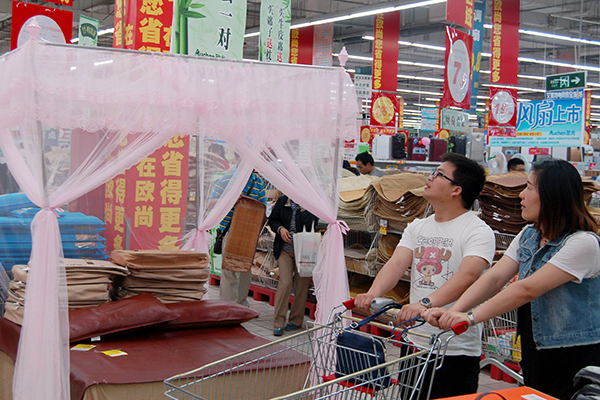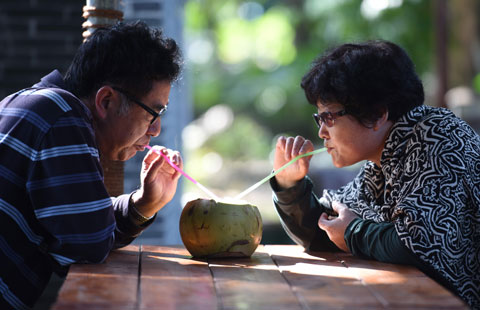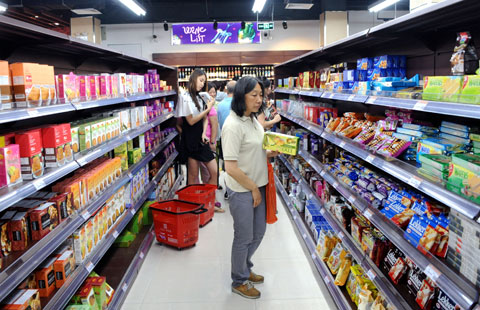Zika boosts mosquito net exports
By Zhu Wenqian and Shi Xiaofeng (China Daily) Updated: 2016-09-14 07:43
 |
|
A couple select mosquito net at a supermarket in Suzhou, Jiangsu province. Chinese families have a tradition of using mosquito nets during the summer. [Photo/China Daily] |
Hundreds of firms in Zhejiang province ride e-commerce wave to meet rising overseas demand for knitwear
Chinese mosquito net makers have reported some 20 percent rise in export volumes on the back of Zika virus concerns in some parts of the Americas, Africa and Asia.
Singapore alone has seen more than 300 cases of virus cases this year.
Huzhou, Zhejiang province, is China's largest center for mosquito net production, where hundreds of firms engage in the business.
The city makes mosquito nets worth nearly 2 billion yuan ($300 million) every year. Some 50 million nets are exported.
Dongren Knitters, a local firm, said its mosquito nets are priced in the range of $2 to $4 and can be bought on e-stores on both domestic and foreign online marketplaces of Alibaba Group Holding Ltd, China's largest e-commerce player.
After Zika fears spread worldwide earlier this year, the company has been receiving more than 10 groups of potential foreign buyers every month.
Dongren Knitters said e-commerce has helped it make its business export-driven and scale up production. Up to 15 million easy-to-use mosquito nets are exported every year, with orders rising 20 to 30 percent annually in recent years.
In the wake of Zika virus outbreak, Dongren Knitters improved the design and properties of its products. The material used to make nets is now infused with a repellent, which enhances the net's ability to protect users from mosquito bites.
Dongren Knitters' nets are mainly exported to Japan, South Korea; South and Southeast Asian countries like Thailand, Pakistan, India and Sri Lanka; African countries Nigeria, Tanzania and Mali; and South American countries Brazil, Argentina and Chile.
In some tropical developing countries where many poor families cannot afford air conditioners and are not even aware of mosquito nets, Dongren Knitters' products became the last line of defense against the Zika virus.
Tong Jianfang, general manager of Dongren Knitters, said: "We mainly focus on customers from tropical countries as they have demand (for nets) all year around, and we won't be affected by the seasons.
"We clinched several deals at international exhibitions and fairs. We also hired English and French translators to take care of overseas orders and promotions at our overseas online platforms."
He said every year, Dongren Knitters provides 5 million mosquito nets to the World Health Organization and the World Children's Fund.
"The requirements of international organizations have encouraged us to improve our skills. Besides meeting all kinds of standards, we try to make our nets physically and chemically capable of warding off mosquitoes."
Fuermei Knitter, another Huzhou-based firm, said it is trying to raise the reputation of made-in-China mosquito nets.
The company exports mainly to Pakistan, Sri Lanka, Brazil, Chile and Argentina. Its exports rose by 10 percent last year. The company has expanded its sales to new markets.
"Of late, we have received a large number of orders from the Middle East and South America," said Zhou Jianquan, general manager of Fuermei Knitter.
"Mosquito nets made in China have been well received during the Rio 2016 Olympic Games this summer, and it has been the best advertisement for Chinese knitting enterprises," he said.
The Huzhou local government is helping knitting firms to find more opportunities to export their products.
For instance, it will help some leading firms to attend business fairs in South Africa and other countries.
Dongren Knitters and Fuermei said in the next few years, they plan to export their products to Europe and other high-end markets by further improving their technical skills and adding value to their products, in terms of design, style and quality.
- Baidu USA permitted to test self-drive vehicle in California
- French classical wear dancing up a storm on the mainland
- Passion for ballet's graceful moves takes off
- Report says grow green cooperation
- Imported, affordable, heady
- Liquid gold, in a nutshell
- Mainlanders chase overseas foods in HK
- Chinese visual tech company launches world's first 3D+VR handset

















